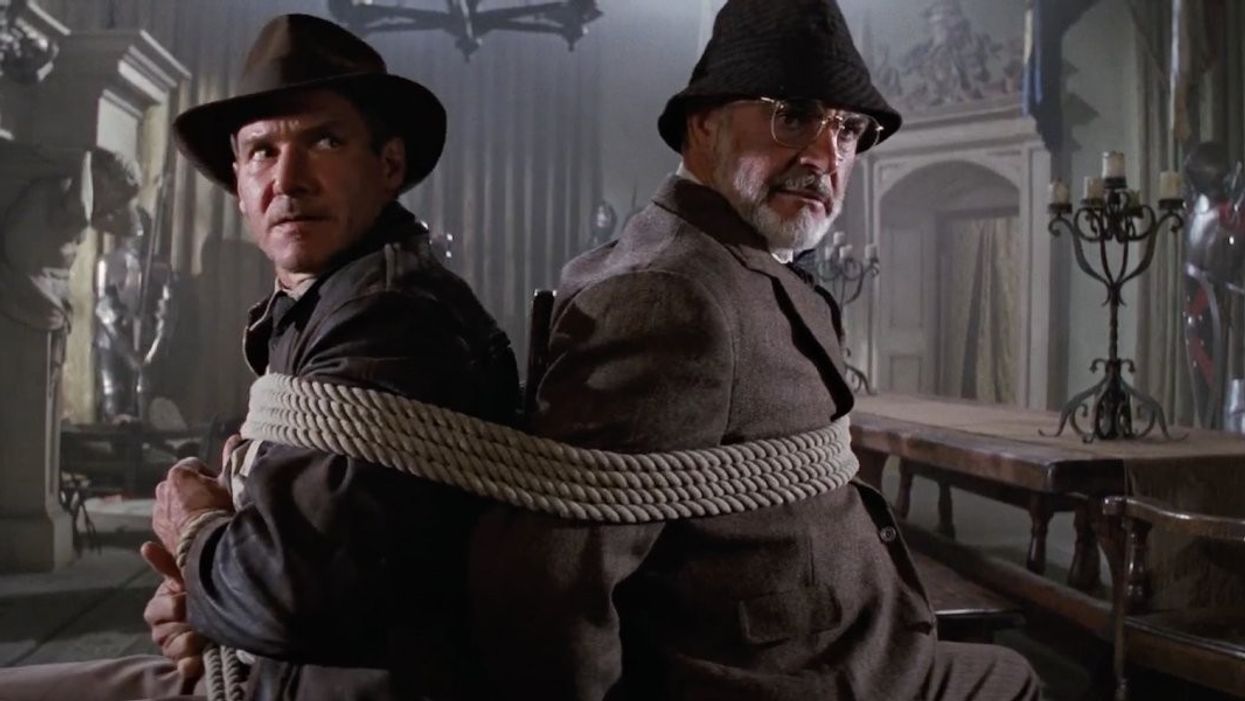Is This Quentin Tarantino's Worst Take Ever?
This is definitely a hot take from the filmmaker, and that's okay!

Quentin Tarantino has a lot of love for movies, both good and bad. His perspective on what makes a film interesting or iconic in the history of cinema is why he is always listening to his takes, but we might have to disagree with him on this one.
On an episode of the ReelBlend podcast to promote their new show, The Video Archives Podcast, Roger Avary and Tarantino struck up a conversation about Steven Spielberg's Indiana Jones franchise after discussing the best movies of all time. During this conversation, Tarantino revealed that he prefers the highly despised fourth movie, Indiana Jones and the Kingdom of the Crystal Skull, to the third film, Indiana Jones and the Last Crusade.
That's right. Tarantino prefers the film with that infamous refrigerator scene and aliens over the father-son action adventure for the Holy Grail.

According to CinemaBlend, Tarantino explained his take, saying:
"I like Crystal Skull more than the Sean Connery one. I don’t like the Sean Connery one. I don’t like [that] one at all. That’s such a boring one. It’s boring! And he’s not an interesting character. The joke is made immediately. It’s like, 'Stop! Or My Mom Will Shoot.'"
Avary didn't share the same sentiments as Tarantino, but he did come out saying he liked the fourth movie as well.
ReelBlend co-host Kevin McCarthy said he doesn't view Crystal Skull as a true sequel in the franchise, and everyone on the NFS team agrees.
After the almost perfect resolution of Indiana Jones' character arc over the franchise comes to a satisfying ending in Last Crusade, Crystal Skull reopened the book to tell a rather bland story. Multiple moments distract from the main narrative that weigh the story down rather than make it a more complex and interesting story to follow. There are no stakes, and no one goes through a satisfying character development throughout the story. Crystal Skull is just bonkers, but that's not why Tarantino likes it.
Is This the Reason Behind Tarantino's Hot Take?
Maybe Tarantino's dislike for the Last Crusade hinges on his issues with father-son narratives. Follow us, here.
Like most great storytellers, Spielberg's childhood affects his filmmaking, often building on the trauma and guilt he experienced growing up. While Spielberg often explores themes of religion throughout his work, his complicated relationship with his father has become the backbone of some of his greatest stories ever put to screen.
The filmmaker admitted that he pinned the blame for his parents' divorce on his father, saying in an interview for 60 Minutes that "...my dad was much more terrestrial, much more grounded, much more salt of the earth. And for some reason, it was easier for me to blame him than it was to someone who I... already exalted."
Spielberg explores the complex father and son relationship throughout many of his films, especially in Last Crusade where the narrative brings the titular character back together with his estranged father. Throughout the film, Jones battles his beliefs about who he thought his father was, while his father learns of the pain he caused Indy throughout his childhood. It's a cathartic exercise of the relationship Spielberg was missing from his life and wanted to resolve in some way.
As for Tarantino, he doesn't seem to long for a cathartic exploration of a son and his estranged father, perhaps because he doesn't want to find forgiveness for his father. Tarantino rarely talks about his estranged father, saying on the WTF podcast, "He had 30 fucking years to find me and he never did. But then when I became famous, he crawled out of the woodwork. It was fucking horrible. It was a drag. He tried to reach out to me. I wasn't interested."
Some of the greatest storytellers tell stories that reflect on the pains and traumas of their lives with the hope to resolve pain in their real lives. While some filmmakers are more open to exploring the complex relationships with their family, partners, communities, or religion, others refuse to acknowledge trauma or play into the nature of those toxic relationships that exist in their lives.
There is no right or wrong way to create art about one's experiences, but it is interesting to see how it potentially influences their appreciation for specific films and stories.
Last Crusade is a film focused on the father-son relationship that, as Tarantino said, might be "boring" to those who have no interest in rekindling a relationship with their estranged parent. Crystal Skull, while inherently campy, instead returned to a quest for historical knowledge and acts of self-preservation.
Let us know what you think of Tarantino's take in the comments below!
Source: CinemaBlend

 "'Back Home"via Mercedes Arutro
"'Back Home"via Mercedes Arutro 'Back Home'via Mercedes Arutro
'Back Home'via Mercedes Arutro 









